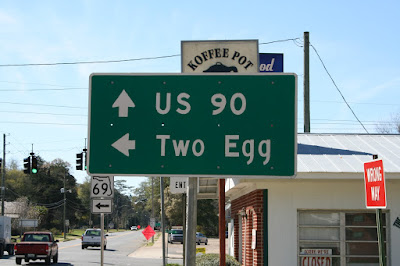Bryson does better with the likes of Who'd A Thought It, Ala.; Greasy Corner, Ark.; What Cheer, Iowa; Looneyville, Texas; Knockemstiff, Ohio; Tightwad, Mo.; Wynot, Neb.; East Due West, S.C.; Superior Bottom, W.Va.; and Embarrass, Wisc., among many others. Both Ohio and Texas have a Lickskillet. Bryson errs when he refers to Two Egg, Fla., as Two Eggs. Two Eggs might make more sense, but what do place names and their spellings (or their pronunciations) have to do with sense?
Many odd place names in America, Bryson tells us, simply result from Americanizing names from other languages. The Indian name Hopoakan was turned into Hoboken. The Dutch Vlachte Bosch and Thynevly became Flatbush and Tenafly. Wabash sprang for the Indian word Ouabasche and Peoria from Peouarea. Similarly, Ouisconsing turned into Wisconsin, while Ouaouiatonon somehow became Iowa.
Chicago got its name from an Indian word meaning "place that stinks of onions," while in French Baton Rouge means simply "red stake."
In many places across the country it is easy to tells outsiders by the way they pronounce the town's name. Locals pronounce Fries, Va., as "freeze." Peru, Ind., is "pee-roo," Beatrice, Neb., is ""be-at-riss," Pompeii, Mich., is "pom-pay-eye," Pierre, S.D., is "peer."
If you want to be the one laughing instead of the one laughed at, perhaps you should just stay home and look at maps.

No comments:
Post a Comment